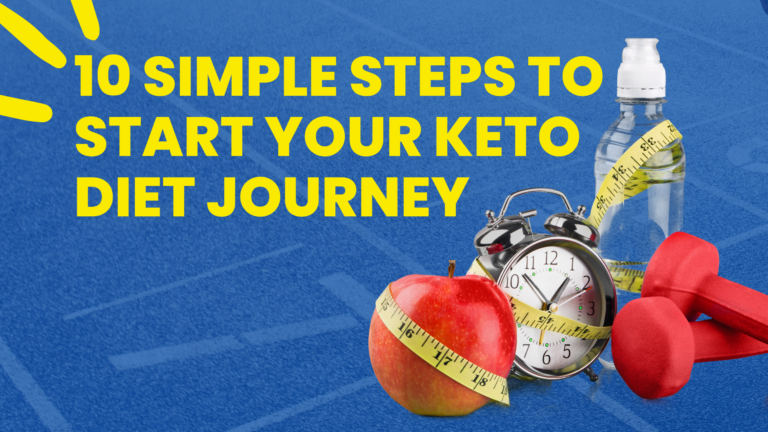Boost Your Energy Levels with the Keto Diet
Are you tired of feeling sluggish and low on energy? Look no further! In this article, we will explore how the Keto Diet can help you boost your energy levels and feel more vibrant throughout the day. The Keto Diet, short for ketogenic, is a low-carb, high-fat diet that encourages your body to burn fat for fuel instead of carbohydrates. By cutting out carbs and increasing healthy fats, your body enters a state of ketosis, where it becomes a fat-burning machine. As a result, you will experience sustained energy levels and reduced cravings for sugary snacks. Say goodbye to the afternoon slump and hello to a whole new level of vitality with the Keto Diet!
Understanding the Keto Diet
The Keto Diet, short for Ketogenic Diet, is a high-fat, low-carbohydrate eating plan that has gained popularity for its potential to enhance energy levels and promote overall health. The primary goal of the Keto Diet is to shift your body into a metabolic state called ketosis, where it primarily burns fat for energy instead of carbohydrates. By drastically reducing carbohydrate intake and increasing fat consumption, the Keto Diet aims to optimize energy production and utilization in the body.
Definition and principles of the Keto Diet
The Keto Diet involves consuming foods that are high in fat, moderate in protein, and very low in carbohydrates. The recommended macronutrient ratio for the Keto Diet is typically around 70-75% of calories from fat, 20-25% from protein, and only 5-10% from carbohydrates. This composition encourages the body to enter a state of ketosis, where it starts producing molecules called ketones from stored fat to fuel the body and brain.
How the Keto Diet affects energy levels
The Keto Diet can have a significant impact on energy levels due to several reasons. Firstly, entering ketosis prompts the body to become more efficient at utilizing fat as fuel, leading to a more stable and sustained energy supply throughout the day. Additionally, the elimination of blood sugar spikes and crashes commonly associated with high-carbohydrate diets helps promote steady energy levels. Lastly, the Keto Diet may provide certain metabolic benefits that enhance overall energy production and utilization in the body.
Effects of Ketosis on Energy Levels
Transitioning into ketosis
When transitioning into ketosis, it’s common to experience a temporary drop in energy levels known as the “keto flu.” This is caused by the body adapting to using ketones as its primary energy source instead of glucose. It’s important to stay hydrated, maintain electrolyte balance, and consume adequate calories to support the transition and minimize fatigue. As the body becomes more efficient at burning fat for energy, energy levels typically stabilize and may even increase.
Increased mental clarity and focus
One of the remarkable benefits of the Keto Diet is the potential improvement in mental clarity and focus. Ketones, the byproduct of fat metabolism in ketosis, can efficiently fuel the brain and provide a steady source of energy, which may lead to enhanced cognitive function. Many individuals report experiencing increased mental sharpness and sustained focus when following a ketogenic eating plan.
Steady and consistent energy levels throughout the day
Unlike the energy fluctuations caused by carbohydrate-heavy diets, the Keto Diet promotes stable energy levels throughout the day. By relying on fat as the primary fuel source, your body can tap into its extensive fat stores for a continuous supply of energy. This steady release of energy can help prevent energy crashes and maintain consistent productivity and mental alertness.
Keto-Friendly Foods for Energy
Healthy fats for sustained energy
One of the key components of the Keto Diet is the consumption of healthy fats. These fats provide a long-lasting and sustainable source of energy. Including foods such as avocados, nuts and seeds, olive oil, and coconut oil in your diet can help ensure you have ample energy throughout the day. These fats also provide essential nutrients and support overall wellness.
Protein sources for muscle repair and energy
Protein is not only essential for muscle repair and growth but also plays a role in energy production. When following the Keto Diet, it’s important to consume adequate amounts of protein to support muscle maintenance and provide a source of energy. Foods like lean meats, poultry, fish, eggs, and plant-based protein sources like tofu and tempeh should be incorporated into your keto meals to maintain optimal energy levels.
Low-carb vegetables for essential nutrients
While the Keto Diet restricts carbohydrate intake, it’s crucial to include non-starchy vegetables to ensure you receive essential vitamins, minerals, and fiber. Leafy greens like spinach and kale, cruciferous vegetables like broccoli and cauliflower, and other low-carb options such as zucchini and bell peppers can provide vital nutrients that contribute to overall energy levels and wellbeing.
Meal Planning for Energy on the Keto Diet
Balancing macronutrients for optimal energy
To maintain and enhance energy levels on the Keto Diet, it’s important to have a well-balanced meal plan that considers your macronutrient needs. Ideally, each meal should contain a combination of healthy fats, protein, and low-carb vegetables. This macronutrient balance ensures a sustained release of energy while supporting overall health and nutritional requirements.
Timing your meals and snacks
Timing your meals and snacks can also play a role in optimizing energy levels on the Keto Diet. Some individuals find that spacing out their meals and snacks evenly throughout the day helps maintain stable energy levels, while others prefer intermittent fasting or consuming larger meals less frequently. Experiment with different eating patterns to determine what works best for your energy needs and preferences.
Hydration and electrolyte balance
Proper hydration and electrolyte balance are essential for maintaining optimal energy levels on the Keto Diet. Ketosis can cause increased water loss and electrolyte excretion, leading to dehydration and potential imbalances. It’s important to drink plenty of water and incorporate electrolyte-rich foods or supplements, such as sodium, potassium, and magnesium, to support hydration and prevent fatigue or muscle cramps.
Managing Exercise and Energy on the Keto Diet
Fueling your workouts with targeted nutrition
When following the Keto Diet, it’s necessary to adapt your approach to exercise and energy management. Fueling your workouts with targeted nutrition can help optimize performance and recovery. Consuming a small amount of easily digestible carbohydrates, such as a piece of fruit or a sports drink, before intense workouts may provide an extra boost of energy. Additionally, healthy fats and protein-rich foods should be consumed post-workout to support muscle repair and replenish energy stores.
Building endurance and stamina
The Keto Diet has been shown to enhance endurance and stamina in some individuals, especially those who are fat-adapted. By relying on a steady supply of fat for fuel, the body can tap into its vast energy reserves and sustain physical activity for more extended periods. However, it’s important to adjust and experiment with your personal nutrition and training strategies to find what works best for your body and specific fitness goals.
Addressing potential performance declines
While many individuals experience improved performance on the Keto Diet, it’s also possible to encounter initial declines in physical performance as your body adapts to using fat as its primary fuel source. This adjustment period is temporary, and as your body becomes more efficient at utilizing fat, performance levels often rebound and even surpass previous levels. Patience, consistency, and gradual adjustments to your training routine can help overcome any temporary performance declines.
Supplements to Boost Energy on the Keto Diet
MCT oil for quick energy
Medium-chain triglyceride (MCT) oil is a popular supplement among those following the Keto Diet for its ability to provide quick and easily accessible energy. MCTs are rapidly absorbed and converted into ketones, which can serve as an immediate energy source for both the brain and the body. Adding MCT oil to your meals or beverages can help boost energy levels and enhance ketosis.
Electrolyte supplements for balance
As mentioned earlier, maintaining electrolyte balance is crucial on the Keto Diet, especially during the initial stages when transitioning into ketosis. Electrolyte supplements, such as electrolyte powders or tablets, can help replenish key minerals like sodium, potassium, and magnesium and prevent symptoms of fatigue, muscle cramps, and weakness.
Adaptogens for stress management
Stress can negatively impact energy levels, and incorporating adaptogenic herbs into your routine can help manage stress and support sustained energy production. Adaptogens like ashwagandha, rhodiola rosea, and holy basil can help the body adapt to stressors and reduce fatigue, promoting overall energy and wellbeing. Consult with a healthcare professional to determine the appropriate adaptogens for your needs.
Handling Keto Fatigue and Side Effects
Understanding the concept of keto fatigue
Keto fatigue, also known as the keto flu, refers to the temporary fatigue or lethargy experienced by some individuals when transitioning into ketosis. It’s a common side effect that typically arises from the body’s adjustment to using fat instead of carbohydrates as its primary fuel source. It’s important to note that keto fatigue is usually temporary and can be minimized by proper nutrition, hydration, and electrolyte balance.
Recognizing and managing common side effects
The Keto Diet may have some potential side effects that can impact energy levels. These can include cravings, digestive issues, and changes in sleep patterns. It’s important to recognize these side effects and address them accordingly. Incorporating nutrient-dense foods, staying hydrated, and ensuring an adequate intake of fiber can help manage these side effects and maintain optimal energy levels.
Seeking guidance from healthcare professionals
If you’re experiencing prolonged fatigue or other severe side effects while following the Keto Diet, it’s essential to consult with a healthcare professional. They can help assess your specific situation, provide personalized recommendations, and ensure you’re receiving the required nutrients while minimizing potential negative impacts on your energy levels and overall health.
Tracking and Monitoring Energy Levels on the Keto Diet
Utilizing energy trackers and journals
Tracking and monitoring your energy levels can provide valuable insights into the effectiveness of the Keto Diet for enhancing energy. Utilizing energy trackers or journals to record subjective feelings of energy, cognitive function, and overall wellbeing can help identify patterns and determine what specific factors may influence your energy levels. This information can guide adjustments to your meal plan, sleep patterns, and exercise routine.
Assessing subjective energy levels
Assessing your subjective energy levels can involve evaluating factors such as your level of fatigue, ability to concentrate, mood, and overall feelings of vitality. Consider keeping a daily journal or using a rating scale to document your energy levels over time. By regularly tracking and assessing your subjective energy levels, you can make informed decisions regarding your diet, lifestyle, and overall energy optimization.
Monitoring performance and progress
In addition to subjective energy levels, monitoring your physical performance and progress can provide valuable feedback on the impact of the Keto Diet on your energy levels. Keep track of your workouts, strength gains, endurance levels, and any other relevant metrics to gauge your overall progress. Periodically reassessing your performance can help you identify areas for improvement and fine-tune your approach to diet and exercise.
Maintaining Long-Term Energy on the Keto Diet
Adapting to the keto lifestyle
To maintain long-term energy levels on the Keto Diet, it’s crucial to view it as a lifestyle rather than a short-term solution. Embracing the principles of the Keto Diet and integrating it into your daily routine can support sustained energy and overall wellness. Making mindful food choices, practicing consistency, and seeking variety in your meals can help ensure lasting success on the Keto Diet.
Prioritizing sleep and stress management
Optimal energy levels on the Keto Diet also depend on factors beyond nutrition. Prioritizing quality sleep and effective stress management are essential to support overall energy and wellbeing. Aim for adequate and consistent sleep patterns, practice relaxation techniques such as meditation or yoga, and engage in activities that bring you joy and reduce stress levels.
Reevaluating and adjusting dietary needs
As with any dietary approach, it’s important to periodically reevaluate and adjust your dietary needs. Depending on your goals, lifestyle, and any specific health considerations, you may need to modify your macronutrient ratios, adjust your calorie intake, or incorporate additional supplements or foods to optimize energy levels and overall health. Consulting with a healthcare professional or registered dietitian can provide valuable guidance in this process.
Conclusion
The Keto Diet offers a promising approach to boosting energy levels and enhancing overall wellbeing. By shifting the body into a state of ketosis, the Keto Diet promotes a sustainable and steady supply of energy, improved mental clarity, and a range of other benefits. However, it’s important to approach the Keto Diet with knowledge, balance, and personalized guidance. Consulting with healthcare professionals or registered dietitians can help ensure that the Keto Diet is appropriate for your specific needs and goals. By incorporating keto-friendly foods, managing exercise and energy, and monitoring your progress, you can harness the power of the Keto Diet to optimize your energy levels and support a healthy lifestyle.










